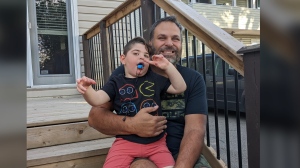The heartbreaking quest of a Toronto family to find a treatment for their son’s extremely uncommon ailment has reached a new high point.
In the past few months, four-year-old Michael Pirovolakis became the first person in the world to get personalised gene therapy for spastic paraplegia type 50, or SPG50, after more than three years of rigorous fundraising and equally arduous research for a potential solution.
This complicated neurogenerative disorder, which is brought on by the absence of a protein in the brain, causes severe developmental delays, leg stiffness and weakness that proceed to paralysis by the age of ten.
Around the world, 80 kids are estimated to have SPG50. Michael, however, is thought to be the only patient in Canada who has the illness.The Pirovolakis family, who live in East York, learned Michael had SPG50 when he was just over a year old.
Determined to help their son, Terry and Georgia Pirovolakis immediately got to work to raise more than US$3 million needed to pay for the experimental treatment that could stop the progression of and maybe even cure their son’s disease.
Navigating the complexities of creating a cure for an ultra-rare illness, especially during a global pandemic, was no easy feat, Terry Pirovolakis admitted.
“It’s been a pretty long journey with lots of ups and down and then delays with COVID,” he said.
“We’re very grateful for our team. For every setback we always had a plan to move forward. We were always hopeful that everything remained on track.”
In December 2020, researchers created a prototype for the treatment and successfully tested it on animals in a laboratory.
Just over a year later on Dec. 30, 2021, Health Canada approved the first human SPG50 clinical trial. The new gene therapy was injected into Michael’s spinal canal at Toronto’s Hospital for Sick Children on March 24.
Dr. Jim Dowling, staff physician at SickKids’ Division of Neurology and a senior scientist in the hospital’s Genetics & Genome Biology program, led Michael’s clinical trial.
Pirovolakis said its all about giving Michael and others with ultra-rare illnesses a “better life.”
His son’s medical team agrees.
“Successfully conducting the trial for Michael was not only a key milestone for him and his family but also for achieving SickKids’ vision for Precision Child Health, a movement to deliver individualized care for every patient,” Dr. David Malkin, who is the CIBC Children’s Foundation Chair in Child Health Research at SickKids, said in a news release.

“Not only can rare diseases be a springboard to figure out how to treat more common conditions, but learnings from Michael’s trial will help carve out a path for SickKids to explore innovative, precision-based treatment options for other patients with rare, genetic diseases.”
Source_globalnews.ca











